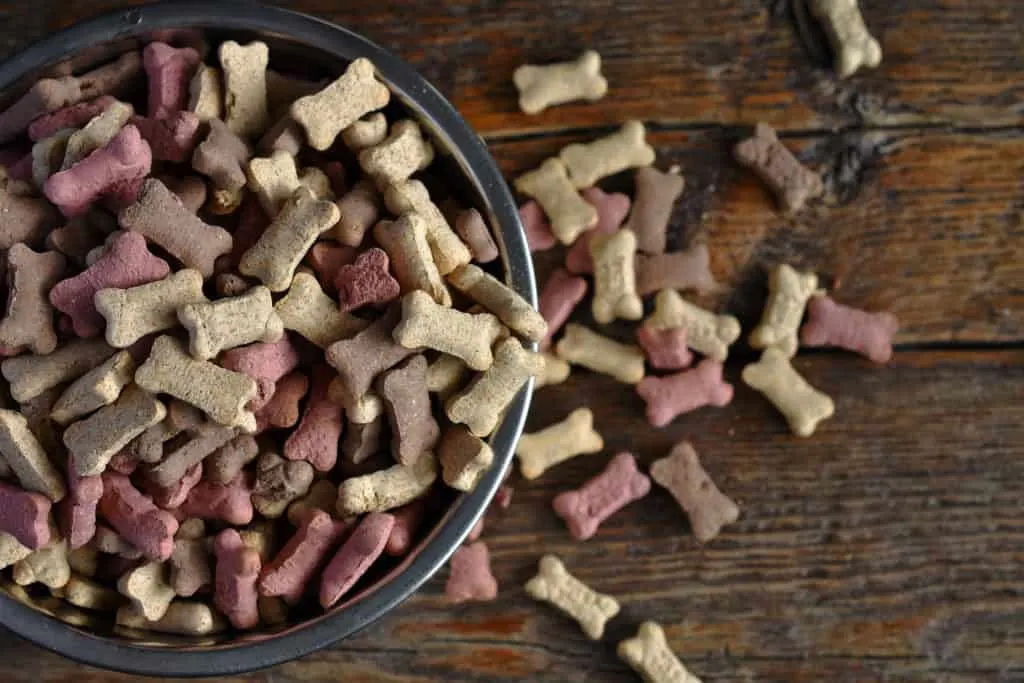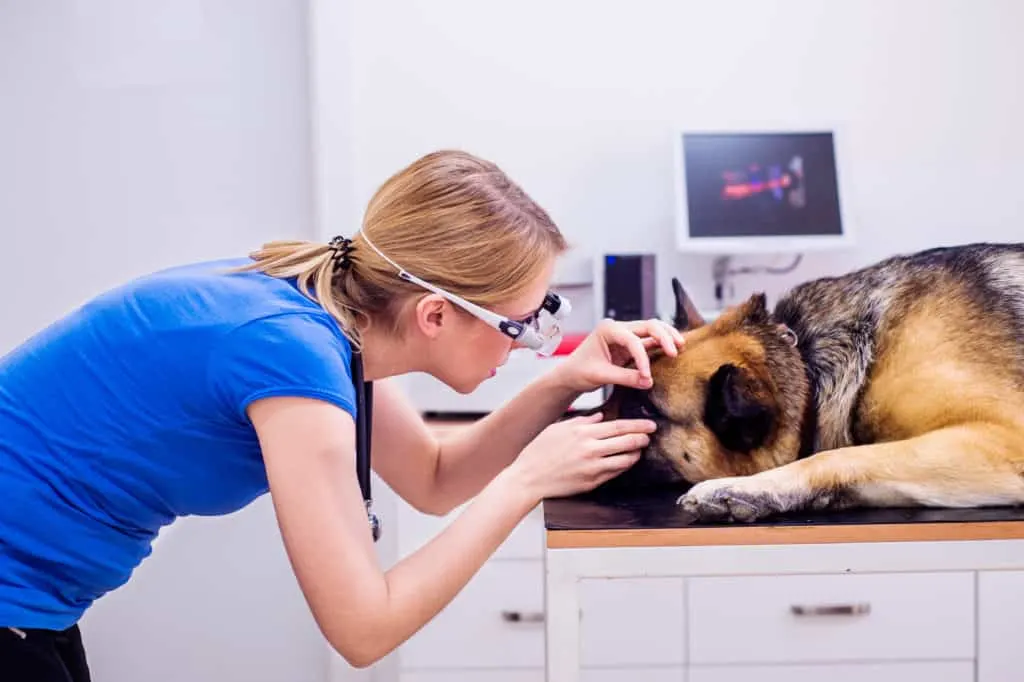
Did you know that obesity in dogs is just as common in humans, if not more? Obesity can have just as severe of an effect on our beloved German Shepherd as it does us, so it’s important to be aware of the risks associated with a bit of extra weight.
In this article we’ll discuss the common reasons behind weight gain in your Shepherd, how to identify if your GSD is overweight, and ways that you can get them on track to a healthy life.
Click Here to Jump to a Section
Is It Dangerous for Your German Shepherd to Be Overweight?
Obesity in dogs is often taken lightly by dog owners. A dog’s weight is not always at the top of an owner’s list of priorities, but be aware that it can lead to some serious complications for your German Shepherd.
Some health conditions that are often linked to or aggravated by obesity include:
- Arthritis: German Shepherds are already prone to arthritis and hip dysplasia as they age, so any extra body fat can exacerbate these conditions, if not bring them on at an earlier age.
If your dog suffers from joint disease, carrying around extra weight can increase their daily pain. It’s important to keep your Shepherd at a healthy weight to help avoid any unnecessary stress on their joints. - Heart and lung complications: Obesity in dogs is linked to heart disease, high blood pressure, and respiratory disorders. If left untreated, any of these conditions can result in serious complications for your furry friend.
- Anesthesia risks: Since obesity can put additional stress on the heart and lungs, these organs will have to work harder if your dog is ever anesthetized.
Any respiratory complications during surgery can result in surgical complications, and can be fatal for your Shepherd. - ACL injuries: The ACL is am important cruciate ligament within the knee that can be strained when put under a large amount of weight.
Obesity over a long period can result in ACL injury, which is a major injury that is extremely painful and requires surgical repair. - Stress on the body: Just like in humans, a large amount of fat distributed throughout the body can put a strain on several body processes.
An overweight German Shepherd can experience heart problems, respiratory problems, joint and muscle injuries, and difficulty carrying out other normal organ functions. - Quality of life: Due to the complications listed above and the additional toll obesity can take on your German Shepherd, being overweight can decrease your dog’s quality of life.
Obesity can also take up to 3 years of your pups life!
Though all of the possible complications listed above should be enough incentive to keep your pup at a healthy weight, another factor to consider is their overall comfort.
Excess weight can take a toll on your beloved Shepherd. Obesity can make each day challenging, it may be harder to get up in the morning, and it could lead to daily pain.
Keeping them slim is not only important for their health, but also their happiness.
How Can You Tell If Your German Shepherd Is Overweight?

When we see our German Shepherd in our home each day, sometimes it’s tough to notice the extra pounds as they’re packed on.
Though it’s best to have your dog seen by your veterinarian for an accurate diagnosis, there are some ways you can assess their weight at home.
- You should always be able to feel each of your Shepherd’s ribs without a layer of fat covering them.
- Your dog should have somewhat of a waist. When standing above them and looking down on their back, you should see at least slight definition between the top half of their body and their waste. Their chest should be wider than their abdomen.
- When looking at them from the side, you should see a dip from their chest leading down to their abdomen, meaning their “belly” should not hand as low as their chest when standing.
- Normal activities such as walking around the house, going up the stairs, or any other low key behavior should not cause your German Shepherd to become winded.
If they are panting often or sleeping the day away, they may be having difficulties related to their weight. - If your Shepherd is no longer interested in things they used to love, or does not readily participate in play like they did before, their lack of desire for play could be related to their weight.
Also consider their weight gain if they become winded easily during play time.
What Can Cause Weight Gain in a German Shepherd?

When it comes to obesity in your German Shepherd, there are a few common reasons behind their weight gain. Some factors contributing to your dog’s weight include:
- Overeating: The most common reason behind weight gain in german Shepherds is simply eating too much.
When a dog is fed large meals or is offered free feeding, their weight can quickly begin to reflect their eating habits. For this reason, it’s best to stick to a set amount of food in the morning and early evening. - Improper diet: The quality of a dog’s food can make a huge difference in their lives. Just as humans would reflect the choice to eat fast food for each meal, an unhealthy dog food can result in weight gain and an overall decline in health for your GSD.
When it comes to the diet you choose for your dog, make sure to offer a quality food with nutritional ingredients, an acceptable calorie count, and a brand that is well known in the pet food industry.
Try not to factor in price when it comes to your dog’s diet. Of all the things to spend a bit of money on for your pup, their diet is one to splurge on. - Eating human food: A proper dog food will include ingredients that are perfectly formulated for your German Shepherd’s health. By giving them human food, you are offering them food that can be high in fat, lacks essential ingredients, and can quickly result in weight gain.
Aside from the threat of weight gain is the possibility of gastrointestinal upset from feeding your dog table scraps. It’s best to avoid these possibilities and refrain from feeding your GSD human food all together. - Lack of exercise: Just like in humans, a lower level of exercise to calories consumed can result in weight gain. It’s important to make sure our pups engage in behaviors that get them up and moving, even if it is just a quick 20 minute game of fetch.
Try your best to make daily activity a part of your and your German Shepherd’s routine, and you can help them maintain a healthy figure. - Spaying/neutering: Spaying and neutering can result in a slowed metabolism, so it’s important to maintain a daily exercise routine and offer your pup a quality diet to help them remain at an acceptable weight.

While the above factors are some of the most common reasons behind a German Shepherd’s weight gain, there are a few medical conditions that can lead to obesity in dogs.
- Hypothyroidism: Hypothyroidism refers to an under-active thyroid gland that can result in weight gain, hair loss, decreased energy, and more.
If it seems like your dog is gaining weight even with consuming a proper amount of an approved diet, it’s best to visit your veterinarian.
- Cushing’s disease: Cushing’s disease is a condition that results in the overproduction of a hormone called cortisol.
This hormone helps the body control weight, so any change in the bodies’ cortisol production can result in weight gain that can be difficult to manage without medical intervention. - Genetics: Some breeds are at a higher risk of obesity than others. With the German Shepherd being prone to weight gain and forms of joint disease, it’s even more important to watch their weight closely as they age.
How Can You Help Your German Shepherd Lose Weight?
When it’s time to begin your German Shepherd’s weight loss journey, there are some steps to follow to ensure their safety during the process. Though weight loss is the goal, this process is not a race and should be approached with care.
Some ways to help your German Shepherd achieve healthy weight loss include:
- If your dog’s weight gain is not due to any underlying medical conditions, then their diet is a great place to start.
First, make sure you transition your German Shepherd to a quality food that promotes weight loss. Some weight control diets we recommend include Royal Canin Weight Control, Purina ProPlan Weight Loss, and Wellness Core Low Fat.
Make sure you transition to any new diet over a two week period to reduce the risk of gastrointestinal upset. - Since many dogs can contribute their weight gain to the amount of food they consume, your next step should involve assessing their food intake.
It’s best to consult with your veterinarian for a proper feeding recommendation for weight loss, as this can be a critical part of their success. It’s important to never attempt to put your dog on a crash diet.
Fasting a German Shepherd or significantly reducing their food intake can result in major health complications, so it’s important to make sure you have a specific plan in place based on your dog’s needs. - Now that you’ve addressed their diet, it’s time to add daily exercise back into their lives. Just as you took the food process slowly, you should take the introduction of exercise slowly too.
Start with a short walk around your neighborhood, or even a 20 minute game of fetch if they like to play. Stick to that pace for a month, then work your way up to longer walks, outdoor adventures, and other more vigorous activities. - When you’re implementing new routines and diets to help your German Shepherd lose weight, it’s important that you track their process to ensure that your plan is working.
Try your best to weigh and measure your dog once a month. If there is no evidence of weight loss (about 3-6% of their daily weight) in the first month, then it’s time to speak with your vet about a new plan of action.
When Should You See the Vet?

Weight loss is actually a delicate process when it comes to our furry friends. Any significant change can truly throw off our pups, so it’s important to discuss your plan of action with your veterinarian when you begin a weight loss program for your Shepherd.
Veterinary advice is helpful for:
- Choosing a quality diet for your German Shepherds weight loss plan. Not all diets are created equal, so it’s important to get veterinary approval before offering your German Shepherd a new diet.
- Determining an adequate feeding schedule and food amount to help your German Shepherd lose weight at a gradual pace. Reducing their food intake too quickly can be dangerous, so it’s always best to get an approved feeding amount from your veterinarian.
- Make sure there are no underlying conditions that are responsible for your German Shepherd’s weight gain. This can be done with routine blood work in your veterinary clinic.
- Help clear them medically for an increase in physical activity. Your veterinarian can rule out any physical ailments that could possibly limit their physical activity or become aggravated with the addition of daily exercise.
- Help you accurately track your German Shepherds progress through specific weighing and measurement. Though you can do this yourself at home, it’s always a great idea to have your veterinarian involved in their progress.
Overall, it’s best to consult with your Shepherd’s veterinarian before any major life change.
Final Thoughts
Obesity can put your beloved German Shepherd at risk to several ailments that can reduce their quality of life.
By understanding acceptable body sizes and healthy diet habits for your Shepherd, you can help to ensure a happy and comfortable future for your favorite pup!
